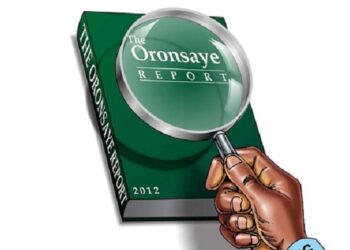The Nigerian Economic Summit Group (NESG) has highlighted some of the major factors responsible for Nigeria’s economic crisis as well as proffered solutions to some of them.
The private sector-led think-tank and policy advocacy group in its analysis pointed out that the country is stuck in a confused economic situation with most economic indicators spiralling out of control, inflicting severe hardship on more Nigerians.
This was made known in a communique issued from the meeting of the Board of Directors of the NESG held on 26 July 2022, and signed by its Chairman, Asue Ighodalo.
The NESG said that the country’s economic growth was dominated by sectors with low contributions to output and weak job-creating capacity, while the oil sector remained in recession for 8 consecutive quarters, with headline inflation at 18.6% according to the National Bureau of Statistics (NBS).
It also stated that despite high global oil prices, Nigeria is not appropriating the benefits due to low crude oil production largely as a result of oil theft and pipeline vandalism, declining investment and divestment caused by oil theft, high cost of production, and a harsh operating environment.
Some solutions to identified factors contributing to Nigeria’s economic crisis include:
- Food crisis: As the world faces a food crisis linked to the Russian/Ukrainian war and the lingering effects of Covid-19 on the global food supply chains, the situation appears more serious in the Nigerian context, given the compounding effects of the unchecked insecurity and inadequate efforts to mitigate the impact of climate change – specifically the severe droughts and floods affecting our farming communities. The NESG states that urgent action is required to ensure food self-sufficiency by prioritising critical value chains and supporting private sector-led interventions to curtail this crisis and build a vibrant and sustainable food ecosystem in Nigeria based on consistent incentives and sanctions.
- Forex crisis: The failure to address the current prevailing condition of multiple exchange rates continues to reduce the much-needed flow of foreign investments and official diaspora remittances. International investors, being savvy and rational, will not invest where there is a real risk to their ability to access and repatriate investment proceeds or when the functional currency is in sporadic depreciation. Multiple foreign exchange (FX) markets with significant price differentials create room for speculation, round-tripping, cronyism, and outright graft – with an attendant adverse effect on the economy. The NESG has advised that there is no better time to harmonise the forex rates than now.
- Fuel subsidy imbroglio: The proposed Medium Term Expenditure Framework of the Federal Government clearly indicates that the rising fuel subsidy costs continue to exceed unsustainable levels. The Federal Ministry of Finance, Budget and National Planning, in its report, clearly stated that the current fuel subsidy regime’s debilitating impact on our fiscal fragility cannot be overstated. The NESG urged the Federal Government to explore a systematic subsidy removal programme that cushions the impact on our most vulnerable population through a well-coordinated and effectively transmitted social protection regime.
- Security challenges: Despite huge budgetary allocation to defence and national security, the current state of insecurity across the country has risen to an alarming level. Despite some changes to the leadership of the national security apparatus, conditions have not improved. There is hardly any need to itemise the adverse impact of insecurity on food prices, productivity, ease/cost of doing business, investor confidence and national pride. The NESG urged the Federal Government to devise a pragmatic national security strategy that unconditionally guarantees the safety of lives and properties within the country






















The single most contributory factor to the country’s economic woes today are the non-producing Refineries.
The tonnes of foreign exchange deployed for importation of PMS has killed the economy and can be reversed within a few weeks.
Contrary to NNPC position on the state of the Refineries, both Warri and PortHarcourt will not cost more than N400 billion to begin production at about 40% capacity.
NNPC management and their collaborators know why – subsidy scam.
If we refine only 200,000 barrels per day, which can be attained, paying subsidy will stop.
Then some governors turn around to suggest, that Nigerians should all be taxed to death, while some people steal all available monies with the government pretending not to see or know.
But no, they want the Refineries to remained closed until Dangote completes his and sell to Nigerians at rates also close to the current subsidy rates.
Rather than Nigeria reap from the current high price of crude, we are running at losses.
the Port harcourt refinery is under rehabilitation..Dangote will sell fuel in respect to the international pricing of crude oil the same way our local refineries ought to do the same if subsidies werent introduced in the first place